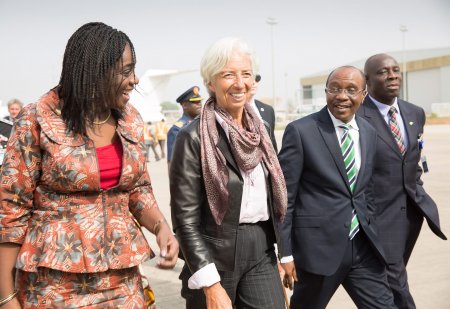P
ProfRem
Guest
The International Monetary Fund has affirmed Nigeria as the biggest economy in Africa, ahead South Africa and Egypt.
Nigeria was reported to have lost its spot as Africa’s biggest economy to South Africa in August 2016, following the recalculation of the country’s Gross Domestic Product.
However, the IMF’s World Economic Outlook for October 2016, puts South Africa’s GDP at 280.36 billion Dollars, from 314.73 billion Dollars in 2015.
Meanwhile, latest estimates from the IMF put Nigeria’s GDP at 415.08 billion Dollars, from 493.83 billion Dollars at the end of 2015.

Although Egypt’s 2016 data was reported as unavailable, its 2015 size remained at 330.15 billion Dollars while that of Algeria, one of the largest economies on the continent, was put at 168.31 billion Dollars.
Global growth is projected to slow to 3.1 percent in 2016 before recovering to 3.4 percent in 2017.
The forecast, revised down by 0.1% point for 2016 and 2017 relative to April, reflects a more subdued outlook for advanced economies following the June U.K. vote in favor of leaving the European Union (Brexit) and weaker-than-expected growth in the United States.
The International Monetary Fund also predicted that the Nigerian economy will grow by 0.6% in 2017, effectively lifting the country out of an officially declared recession.
Nigeria was reported to have lost its spot as Africa’s biggest economy to South Africa in August 2016, following the recalculation of the country’s Gross Domestic Product.
However, the IMF’s World Economic Outlook for October 2016, puts South Africa’s GDP at 280.36 billion Dollars, from 314.73 billion Dollars in 2015.
Meanwhile, latest estimates from the IMF put Nigeria’s GDP at 415.08 billion Dollars, from 493.83 billion Dollars at the end of 2015.

Although Egypt’s 2016 data was reported as unavailable, its 2015 size remained at 330.15 billion Dollars while that of Algeria, one of the largest economies on the continent, was put at 168.31 billion Dollars.
Global growth is projected to slow to 3.1 percent in 2016 before recovering to 3.4 percent in 2017.
The forecast, revised down by 0.1% point for 2016 and 2017 relative to April, reflects a more subdued outlook for advanced economies following the June U.K. vote in favor of leaving the European Union (Brexit) and weaker-than-expected growth in the United States.
The International Monetary Fund also predicted that the Nigerian economy will grow by 0.6% in 2017, effectively lifting the country out of an officially declared recession.

